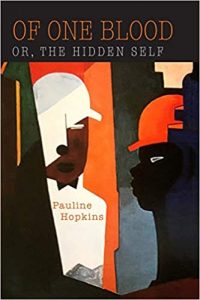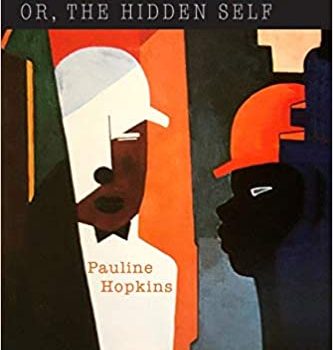Ian Mond Reviews Of One Blood: Or, the Hidden Self by Pauline Hopkins
 Of One Blood: Or, the Hidden Self, Pauline Hopkins (Poisoned Pen Press 978-1-464-21506-3, £11.05, 208pp, tp) February 2021.
Of One Blood: Or, the Hidden Self, Pauline Hopkins (Poisoned Pen Press 978-1-464-21506-3, £11.05, 208pp, tp) February 2021.
Recently I asked my friends list on Facebook (many of them genre fans) if they recognised the name Pauline Hopkins. The vast majority said no. To be fair, I had no idea who she was either. If not for Poisoned Press and the Horror Writers Association reprinting Hopkins’s Of One Blood, Or, The Hidden Self, as part of The Haunted Library of Horror Classics, I would likely have remained ignorant. And that’s concerning because I should be aware of Hopkins’s work. We should all be. According to Professor John Cullen Gruesser, Hopkins was “the most prolific African American woman writer and the most influential black literary editor of the first decade of the twentieth century.” For several years she edited The Coloured American Magazine (at the time the widest circulating African American literary publication) arguably penned the first mystery story by a black writer, imagined an African utopia six decades before Wakanda (likely influenced by the writings of Drusilla Houston), and, as Nisi Shawl remarks in her excellent introduction to Of One Blood, is the “foremother” to writers like Octavia E. Butler, Tananarive Due…
…and many of today’s leading science fiction, fantasy, and horror authors – primarily because she’s another African-descended woman using a popular genre to write speculatively about hard philosophical questions, surprising truths, and the wonders of the occult.
My ignorance could possibly be excused if Of One Blood was a dated, poorly written yawn-fest of a novel. It’s anything but. The book has all the hallmarks of a Victorian romance, pumped with melodrama, larger than life characters and a plot that veers in unexpected directions. It starts sedately enough with our hero, Reuel Briggs, a medical student with a speciality in brain diseases, sitting in his bedsit, pondering the occult and the mysteries of the human mind. With a storm brewing outside, Briggs spies a face “silhouetted against the background of lowering sky and waving branches… framed in golden hair, with soft brown eyes, deep and earnest… rose-tinged baby lips, and an expression of wistful entreaty.” The face vanishes, but later that night, invited to attend a concert by his best friend Aubrey Livingston, Briggs is entranced by one of the Negro singers, Dianthe Lusk. Not only has she a voice that would make an angel swoon, and not only is her skin surprisingly fair (“She was not in any way the preconceived idea of a Negro”) but with chestnut hair and “great, melting eyes of brown,” her countenance matches the face Briggs saw earlier that afternoon. The next day tragedy strikes; Ms. Lusk dies in a train accident. Briggs, who encountered Ms. Lusk the night before in mysterious circumstances (“she said in a low, clear, passionless voice: ‘You can help me, but not now; tomorrow”) claims the young woman is in “suspended animation” and, to prove his point, promptly resurrects Ms. Lusk from the dead. And that’s just the end of chapter four. The next 21 chapters involve a love triangle, betrayals, family secrets, astral travel, and the search for the ancient city of Meroe.
For all the plot shenanigans, each implausible twist is in service to Hopkins’s provocative argument – both then and now – that race is skin deep. The second chapter opens with a hopeful refrain about the end of slavery, marking “a new era in the life of the nation” where “under the spur of the excitement occasioned by the Proclamation of Freedom” philanthropists were “anxious to prove that the country was able, not only to free the slave but to pay the great debt it owed him.” A century later and given what we know about the failures of Reconstruction and America’s deep racial divide that justifiably boiled over during 2020, it’s hard to share Hopkins’s optimism. And yet, it’s this sense of hope that informs the novel’s humanist and speculative attitude toward race. With every revelation, whether it’s the early disclosure that Briggs, a brilliant physician, has Black ancestry and is passing for white, or the discovery of the lost city of Meroe, a technologically advanced utopia where the black populace live in peace and prosperity, Hopkins makes a mockery of the racist view – lauded by imperialists, slave owners, and white supremacists – that a culture should be judged on their technological achievements. The backend of the novel, with its soap-opera ending as secrets are unearthed and the true identity of the main characters are revealed (to the gasps of the audience), only reinforce Hopkins’s view that we are all of one blood. It’s heady stuff, and while we might find Hopkins’s view on race naïve and even misguided, the clarity of her thinking, and the entertaining way she delivers it, makes for a rather remarkable book. With Nisi Shawl’s introduction, the helpful annotations throughout the text, and end material that provides an excellent and diverse list of further reading, particularly from authors of colour, I can only hope that the reissue of Of One Blood: Or, The Hidden Self will reinvigorate discussions about Pauline Hopkins and her work, ensuring she will no longer be a name to stump your mates on Facebook.
This review and more like it in the February 2021 issue of Locus.
 While you are here, please take a moment to support Locus with a one-time or recurring donation. We rely on reader donations to keep the magazine and site going, and would like to keep the site paywall free, but WE NEED YOUR FINANCIAL SUPPORT to continue quality coverage of the science fiction and fantasy field.
While you are here, please take a moment to support Locus with a one-time or recurring donation. We rely on reader donations to keep the magazine and site going, and would like to keep the site paywall free, but WE NEED YOUR FINANCIAL SUPPORT to continue quality coverage of the science fiction and fantasy field.
©Locus Magazine. Copyrighted material may not be republished without permission of LSFF.







